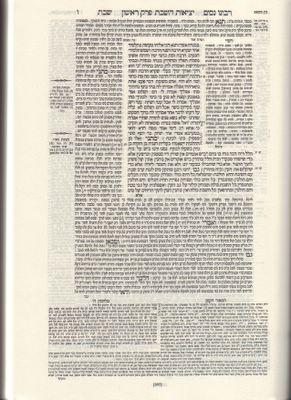
HIDE/SHOW IMAGE
{Shabbat 13a continues}
[It was taught in the] Tanna DeBei Eliyahu {a Midrash taught to the third century Babylonian Amora Rav Anan by Eliyahu}: It once happened that a certain scholar who had studied much Bible and Mishnah and had served scholars much, yet died in half his years. His wife took his tefillin and carried them about in the synagogues and schoolhouses and complained to them: it is written in the Torah {Devarim 30:20}:
And no man {could} answer her.
On one occasion I {Eliyahu} was a guest at her house, and she related the whole story to me.
I said to her: 'My daughter! how was he to thee in thy days of menstruation?'
She said to him: 'God forbid! He did not touch me even with his little finger.'
'And how was he to thee in thy days of white [garments] {during the seven clean days following menstruation}?
She said to me: 'He ate with me, drank with me and slept with me in bodily contact, but chas veShalom it did not occur to him to do other.'
I said to her: 'Blessed be the Omnipresent for slaying him, that He did not condone on account of the Torah! {alternatively, because he, the husband, did not show respect for Torah}
For the Torah says {Vayikra 18:19}:
| יט וְאֶל-אִשָּׁה, בְּנִדַּת טֻמְאָתָהּ--לֹא תִקְרַב, לְגַלּוֹת עֶרְוָתָהּ. | 19 And thou shalt not approach unto a woman to uncover her nakedness, as long as she is impure by her uncleanness. |
In the West {in Israel} they said: Rabbi Yitzchak bar Yosef said: An apron {or knickers} interposed between them.
{The Rif skips several pages involving discussion about tum'ah, ritual impurity.}
MISHNAH.
AND THESE ARE OF THE HALACHOTH WHICH THEY STATED IN THE UPPER CHAMBER OF HANANIAH B. HEZEKIAH B. GARON, WHEN THEY WENT UP TO VISIT HIM. THEY TOOK A COUNT, AND BETH SHAMMAI OUTNUMBERED BETH HILLEL.; AND ON THAT DAY THEY ENACTED EIGHTEEN MEASURES.
{Shabbat 17b}
BETH SHAMMAI RULE: INK, DYES AND ALKALINE PLANTS {so Jastrow; but Rashi: horse beans, used for cattle} MAY NOT BE STEEPED UNLESS THEY CAN BE DISSOLVED WHILE IT IS YET DAY; BUT BETH HILLEL, PERMIT IT.
BETH SHAMMAI RULE: BUNDLES OF WET FLAX MAY NOT BE PLACED IN AN OVEN UNLESS THEY CAN BEGIN TO STEAM WHILE IT IS YET DAY, NOR WOOL. IN THE DYER'S KETTLE UNLESS IT CAN ASSUME THE COLOUR [OF THE DYE]; BUT BETH HILLEL PERMIT IT.
{Shabbat 18a}
Gemara:
The Sages learnt {in a brayta}: Water may be conducted into a garden on the eve of the Sabbath just before dark, and it may go on being filled the whole day; and a perfume brazier may be placed under garments which continue to absorb the perfume the whole day; and sulphur may be placed under [silver] vessels and they undergo the process of sulphuring the whole day; and an eye salve may be placed on the eye and a plaster on a wound and the process of healing continues all day. But wheat may not be placed in a water-mill



No comments:
Post a Comment